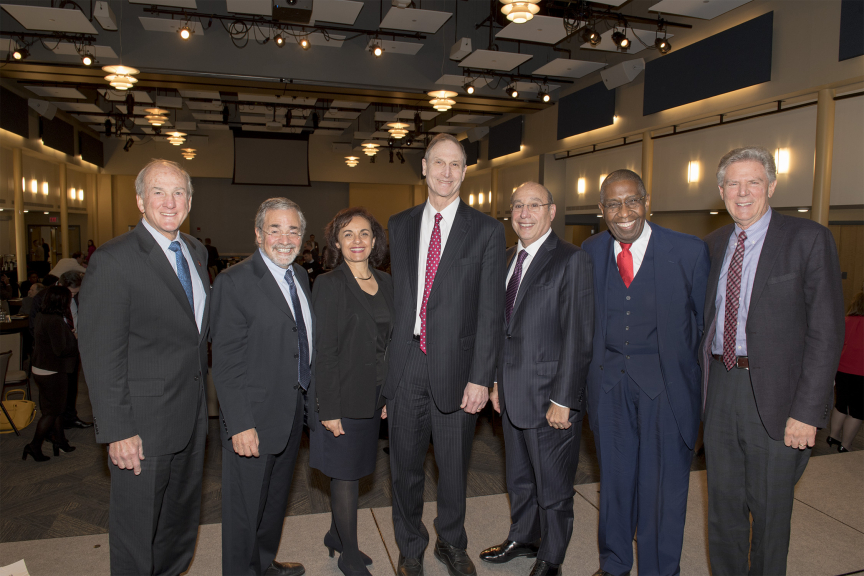First Academic Health Symposium Probes Challenges and Looks to Future Opportunities for Health Partnership
Climate change, market forces, patient participation among key issues

Leaders from Rutgers Biomedical and Health Sciences and RWJBarnabas Health discussed challenges facing health care nationwide and in New Jersey Tuesday at an inaugural Academic Health Symposium.
"We should be creating the future, but we also have a challenge to deliver care today," Rutgers University President Robert Barchi said as he opened the gathering.
The event, which kicked off a series of symposia marking the partnership between the two institutions, started with a keynote address by David Blumenthal, president of The Commonwealth Fund, a national philanthropy engaged in independent research on health and social policy issues.
Blumenthal focused on four issues – the dynamics of health care markets and the unique way in which U.S. health care is organized; how health care affects and is affected by climate change; “miracle cures” and treatments that are too expensive for our system and patients; and how patients use technology to ask more questions and gain more information about their health.
Blumenthal reflected on what these challenges mean in New Jersey, at Rutgers and at RWJBarnabas Health in a morning panel discussion that included Rutgers President Robert Barchi; RBHS Chancellor Brian Strom; Barry Ostrowsky, president and CEO of RWJBarnabas Health; Dean Sherine Gabriel of Rutgers Robert Wood Johnson Medical School; Dean Robert Johnson of Rutgers New Jersey Medical School; and Rep. Frank Pallone.
In July, RWJBarnabas Health and Rutgers University officially launched a public-private partnership to jointly operate a world-class academic health system dedicated to life-changing research, clinical training of tomorrow’s health care workforce, and high-quality patient care, consistent with the missions of Rutgers and RWJBarnabas Health.
RWJBarnabas Health will invest $100 million initially, and then more than one billion dollars over 20 years to expand in the education and research mission of the integrated academic health system.
“This partnership is about how we are best mobilized to have an impact on our New Jersey citizens,” Ostrowsky said. “Today is a celebration of this historic partnership, and it excites me that we have a partnership that is culturally and philosophically aligned.”
At Tuesday's event, panelists discussed how to effectively provide care that sets patients up to live healthier, happier lives in an ever-changing landscape. Numerous themes emerged surrounding the need to communicate more effectively with patients, to reduce disparities in health care and embrace diversity through education among providers.
“Passive education doesn’t change behavior,” Strom said. “Education and communication are necessary but not sufficient. We must go beyond that if we want to change behavior.”
The panelists emphasized the importance of understanding patient needs and engaging patients and communities as partners in research labs, in teaching and in developing community programs. Such collaboration would ensure that both patients and providers work together to follow clinical recommendations.
The panelists also discussed the influence of race in health care. “If you are raised in a black environment or a white environment, that is what you are going to be most comfortable in,” Johnson said. “But by promoting a diverse environment – one in which you are raised, educated in and educated by diversity – you are better able to respond. At this university, we have tried hard to make sure we are diverse and, in fact, are one of the most diverse in the nation.”
Pallone added to the discussion by highlighting the importance in researching diseases that affect both broad and diverse populations, raising the point that everyone can spread illness so if populations are excluded from health care, everyone is hurt.
The afternoon featured topical presentations on the challenges and disparities of the United States’ aging population, which will soon make up 25 percent of the population as well as 25 percent of the workforce, according to XinQi Dong, director of the Rutgers Institute for Health, Health Care Policy, and Aging Research.
Geriatric experts from RWJMS and RWJBarnabas discussed some of their initiatives and research to address the needs of seniors, so different generations of learners – including clinicians, faculty and students – can determine how to work together to develop meaningful curricular and health care change.
“As an academic health system that endeavors to serve the population of New Jersey, we clearly have our work cut out for us, but we are excited to continue to address challenges and issues,” Strom said.
The event can be viewed in its entirety here.